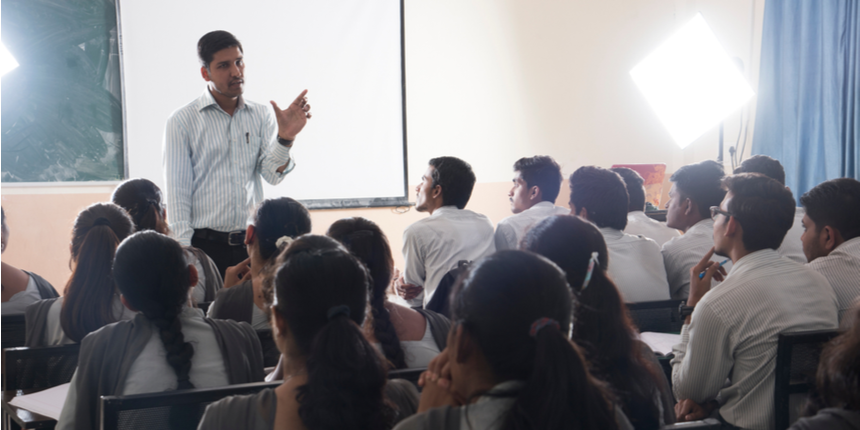Coronavirus Lockdown 2: Many pvt schools have stopped paying teachers
Atul Krishna | April 15, 2020 | 10:14 AM IST | 4 mins read

NEW DELHI: This is Ananya’s (name changed) first job and she couldn’t have joined at a more turbulent time.
Ananya was asked to join as a teacher in a private school in West Delhi on April 1, a week after Prime Minister Narendra Modi announced a nationwide lockdown on March 24.
The school management told Ananya that they would pay less than half of her promised salary for the first 15 days and chose not to elaborate on what will happen thereafter.
“They told me they will only pay 40 percent of the salary for the first 15 days. They said it is up to me whether I agreed to it or not,” said Ananya. “See, everybody is aware of the situation in the entire world, not just in our country. People have lost their jobs. Keeping that in mind I wanted to save my job and agreed.”
Ever since the number of positive cases for coronavirus started rising in the country, schools and universities shut down and the education system froze. During this crisis, private schools have refused to pay many teachers their salaries.
Uncertainty
Ananya said that she’s not even sure what they will pay her after the first 15 days. “There is no contract. I was not even given the offer letter. So, they are not liable to pay me anything. They just offered without giving anything in the writing,” she said.“I’m at loss because I don’t have any proof that I’m working with them.”
She isn’t alone. “I haven’t received payment for the past 15 days,” said a physical education teacher at a South Delhi private school. “Same for all other teachers. It is quite difficult to manage finances because we haven’t yet gotten the salary.”
With PM Modi extending the lockdown till May 3 and talk of an impending recession, jobs have been hit across industries. This has raised doubts about whether all parents could afford to pay school fees at the time.
In private schools, the salary for teachers and staff are distributed from the school fee collected from students.
“No school in Delhi has the funds except the top ten schools, even they may not have it. We have to give salary to teachers and staff. The salary mostly depends on the students’ fees,” said R.C Jain, President of Delhi State Public Schools' Management Association.
‘A familiar issue’
But not all of the blame can be shifted onto the ongoing pandemic.
Anju Verma, a Hindi teacher, had re-joined a West Delhi school after it was placed under the control of Delhi Government’s Directorate of Education (DoE) by a Delhi High Court order in March 2019. Verma, along with other teachers, had taken the school to court in 2014 after repeated instances on non-payment of salaries over years.
Apart from withholding salaries, the owners had also fired permanent teachers before the High Court intervened and brought the school under the DoE. But even after the school came under the directorate, things didn’t change much for the teachers.
“Initially, they didn’t give salary from July to November 2019. Later, when the court ordered, 30 percent salary was given. We only got Rs 5,000 or Rs 6,000 every month,” said Verma adding that she has been receiving just a fraction of her salary the whole year. Toward the end of March, things go even worse.
“I haven’t got the March salary, even the 30 percent hasn’t come,” said Verma. “They are saying that it is because the chartered accountant cannot come to the school. DoE said they don’t have the documents so they can’t reimburse the fee. This can’t be an excuse because the lockdown will continue further. What will they do then? What will we eat?” Verma asked.
Verma’s husband runs a small stationery shop which has been shut during the lockdown.
“We’re surviving on what we have saved so far. If that is over then our situation will be difficult,” she added.
'Finding solutions'
School managements said that they have approached the government to find a solution for this.
Jain has blamed the lockdown for not being able to pay the teachers on time.
“We have not been able to pay the salary to the staff yet. How can we pay when even the accountants cannot reach the school,” said Jain. “We have asked the government to at least let us open the offices and the parents who can afford to give the fees should provide it. Not everyone will have a problem with paying the fees. So those who can afford to pay should because we have to pay teachers and staff also.”
Jain has another possible solution in mind – the government could pay private schools what it owes in fees for students admitted through the 25 percent free quota for the Economically Weaker Sections and Other Disadvantaged Groups, or EWS-DG category students. The quota for poor children in private schools was mandated by the Right to Education Act 2009.
“The government hasn’t paid the dues till 2019. Let them pay the dues till 2020 and then the parents who can afford to be pay should also pay the school fees,” said Jain.
Also read:
Lockdown 2: Struggling to teach online, DUTA opposes online exams
Lockdown 2: JNU to decide on digital exam, courses by April 16
Write to us at news@careers360.com.
Follow us for the latest education news on colleges and universities, admission, courses, exams, research, education policies, study abroad and more..
To get in touch, write to us at news@careers360.com.